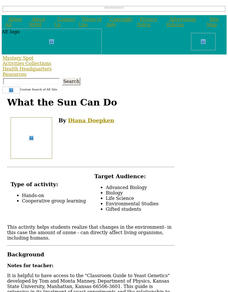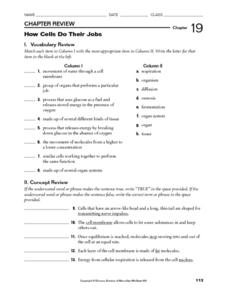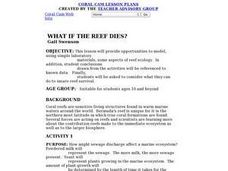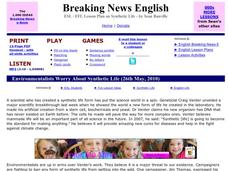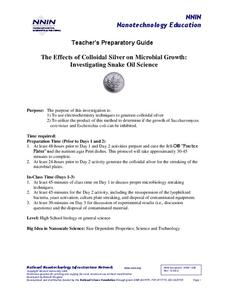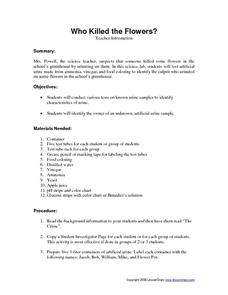Curated OER
Helpful Microorganisms
Students study how some microorganisms are helpful and practical in foods. They work with microorganism in a number of food, such as yeast in bread and yogurt.
Curated OER
What the Sun Can Do
Pupils develop and test a unique, personally-relevant hypothesis about the consequences of exposure to UV radiation based units on a living organism, common baker's yeast (Saccharomyces cerevisiae).
Curated OER
Cheese Please
Students make cheese in their classroom! In this cheese lesson plan, students use bacteria and active culture to clot and age cheese that could be edible in the future.
Curated OER
Can You "Gas" What's Happening?
Students examine gas production in "soil" samples through hands on activities and class discussions, to determine if the soil samples have contain living or non-living systems.
Curated OER
ABOUT ALL YOU CAN EAT: Superfoods
Learners trace back through time to see how the nutritional value of food consumed was enhanced. In this nutrients instructional activity students complete several activities that show the mass of food, and its PH value.
Curated OER
Island Biogeography
Learners work in small groups to sort through photos of an ecosystem following a major disturbance. They place these photos in chronological order to show the process of succession. They then do an experiment with yeast to show the...
Curated OER
How Cells Do Their Jobs
In this cells learning exercise, students will review cell characteristics and structure and different types of cells and what role they play in the body. Students will investigate experimental results of the influence of sucrose on the...
Curated OER
From Wheat to Bread
Students complete a sequence activity to explore wheat processing. In this wheat processing lesson, students color and cut out the pictures of images about the process of forming bread from wheat. Students order the pictures to...
Curated OER
Reading Labels
In this food labels worksheet, students answer short answer questions and multiple choice questions based on the food labels they are given. Students complete 4 activities.
Curated OER
Partnership in Science Education
Students compare two regions of the world, their own and one many miles away. They explore and compare these two places and prepare a report that gives a complete comparison and description of the two regions. They collaborate in...
Curated OER
Cell Respiration
In this biology worksheet, learners complete a crossword puzzle with 17 questions about the processes involved in cellular respiration.
Curated OER
Our Food and Microorganisms
Students answer questions about how microorganisms can affect our food supply and how they can be controlled. The first set of inquiry activities are directed by the teacher. Subsequent activities are based on students generating their...
Curated OER
Microorganism Multiplication
Seventh graders complete two experiments to learn about harmful and helpful microorganisms. In this microorganisms instructional activity, 7th graders read background information about fungi, yeast, and club fungi. Students then complete...
Curated OER
Is It Alive?
Eighth graders define the boundaries of living organisms. They determine what makes something a living organism and identify factors that constitute "living." Pupils write a conclusion about the evidence they found that yeast is alive...
Curated OER
From Seed to Bread
Learners examine how some of their food comes from plants by baking bread. They listen to teacher read alouds that set the stage for the activity.
Curated OER
What If the Reef Dies?
Learners complete four activities to investigate how reef ecology can change. They perform experiments to show how sewage discharge can affect a marine ecosystem, look at substances that don't dissolve in water, examine wave action...
Curated OER
Breaking News English: Environmentalists Worry About Synthetic Life
In this ESL reading comprehension learning exercise, students read or listen to the passage, then complete a wide variety of warm-up activities, as well as before listening/reading, while listening/reading, after listening/reading,...
Curated OER
Spud Smear
Students study various samples of microorganisms in petri dishes. In this microorganism lesson, students place various samples of items in petri dishes and observe them after several days of incubation.
Curated OER
Pretzel Mania
In this activity, students enhance their number and letter recognition. Students make letters and numbers with pretzel dough. Students prepare the pretzel dough, shape it, bake it, and eat it. In this activity, students test their...
American Chemical Society
A Catalyst and the Rate of Reaction
More than 90 percent of chemical products are made using a catalyst. Lesson demonstrates the way a catalyst changes the rate of reaction without altering the chemical reaction. A catalyst doesn't appear as a reactant or a product, yet it...
Virginia Department of Education
The Effects of Heat and Acid on the Enzyme Catalase
How quickly do enzymatic reactions occur? Assist the class as they examine heat and pH change to determine the rate of chemical reactions using catalase as an enzyme. Watch them "glow" with excitement!
Nuffield Foundation
Nitrogen-Fixing Bacteria in Root Nodules of Leguminous Plants
Fixin' to add a great resource to your plans? Scholars perform an experiment to investigate nitrogen-fixing bacteria from plant roots. Along the way, they learn about the concepts of symbiosis and mutualism.
National Nanotechnology Infrastructure Network
The Effects of Colloidal Silver on Microbial Growth: Investigating Snake Oil Science
Can your classes solve the problem of the smelly sweat sock? Young scientists complete a lab investigation that begins by using electrochemistry to generate colloidal silver. They use their solutions to test the rate of microbial growth...
Lesson Snips
Who Killed the Flowers?
This could be really good, or it could be really bad! The crime to be solved is, "Who went pee in the flowerpot?" Given four imitation urine samples, young chemists or crime scene investigators perform pH, glucose, and turbidity tests to...



